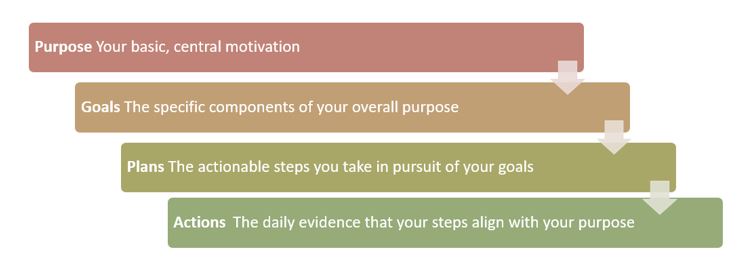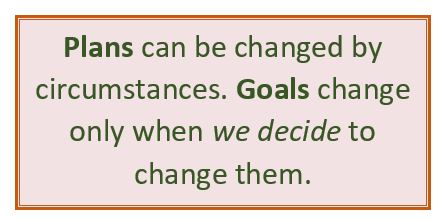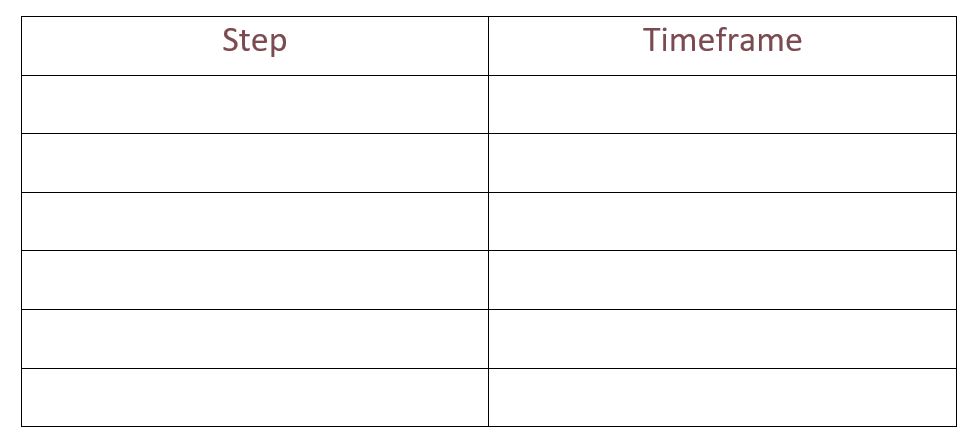How to Make Your Writing Goals Stick This Time

The start of a new year is a good time to set new goals for your writing, or dust off the old ones and get back to work on them. If you’ve had trouble sticking with your goals in the past – or if you’ve even avoided setting goals because you don’t believe you’ll keep them, you might want to look at goal-setting differently.
Choosing and committing to goals has to start with a clear understanding of your purpose for writing in the first place. You want your goals to be determined by that purpose – not something you arbitrarily choose to focus on, what seems fashionable to do right now, or what other people are doing. Goals rooted in purpose help you see that the basic daily actions you take toward them are in fact fulfilling in themselves. Success doesn’t come at the end of the process, when goals are met. It comes in the process, every day you engage in it.

It Starts with Purpose
To start your goal-setting, sit down in a comfortable spot, give yourself some time to settle in, and then jot down your thoughts on the following questions about where you are now with your writing and where you might be headed. Give yourself just a couple of minutes on each question. You can always go back and fill in additional thoughts that come to you later.
1. Why do you write? Depending on how long you’ve been at it, this might be a hard question to answer. Think back to the original goal or motivation that started you writing. Is that goal or motivation still relevant and important—to you? – to your audience?
2. Is the writing you’re doing right now – the genre, the topic, the purpose—fulfilling to you? Do you enjoy your writing time? What aspects of it?
3. What’s motivating you to write today? What’s most important to you about writing?
4. What role does writing play in your life? I tend to divide writers into three categories. Which best describes where you are with your writing?
- Knitting club – writing is a fun hobby you do in your spare time. You like to gather with others who also enjoy writing, reading, and talking about writing-related topics. Sometimes you write a lot for a while; other times writing goes on the back burner while your attention turns to other things.
- Olympic athlete – your writing is an important goal in your life, but you do have a full-time job and other responsibilities. Like an amateur athlete training for the Olympics, you’re committed to giving as much time as possible to growing your writing career while still maintaining your current situation.
- Entrepreneur – writing has become an avenue for earnings, whether full or part-time. Getting paid to write has brought deadlines and expectations along with the recognition and fulfillment. Your writing time has become more necessity than nicety.
5. What is it you’re striving for in your writing?
6. What role would you like writing to play in your life? Do you want to move from Olympic athlete to entrepreneur? From entrepreneur to knitting club?
7. What have you always wanted to do with your writing? One person in my writers’ workshop answered, “Pay a bill with my writing.” Your answer might be less practical. It might focus on what you want to do for readers or for yourself.
8. What resources might you need to further your writing? Support? Education? Money? What are some strategies you might use to get them?
Translate Purpose to Goals
As you gain clarity about your purpose for writing, your next step is to identify goals to accomplish it. Each goal is a specific way you could accomplish your purpose. What does that look like? Here are some examples.
Purpose: Help single parents raise happy, healthy kids while maintaining their own sanity.
Goals:
- Write a blog with bite-sized tips that busy parents have time to read
- Create a website with quick tips on common parenting issues
- Moderate an online community where parents can share their experience
- Create a podcast for single parents
- Submit for publication the best of your blog content as a book
Purpose: Use your poetry to make readers laugh and brighten their day
Goals:
- Create a poem-a-day blog on your website
- Use lines from your poems to create and post memes on social media
- Submit for publication a gift book called Laughter is the Best Medicine to be sold in hospital gift shops
Purpose: Use your talent for writing fiction to entertain readers and gain recognition and income
Goals:
- Draft a novel
- Join a writers’ group to get feedback on it
- Learn how to write a query and book proposal
- Submit the book to publishers
Notice that goals are always steps that you can take, not the outcome of those steps. “Submit a book for publication,” is a goal. “Get a book published” is an outcome. Our goals have to rely on actions on our part, not the decisions of others. That way, we can measure our progress and know when our goal is accomplished. If our actions don’t have the outcome we hope for, we can change our actions and try again.
Goals vs. Plans
Once they have goals set, a lot of people stop there. But that’s only halfway to the finish line. Goals are what we want to do. Plans are how we expect to do it.

This distinction might not sound like much, but it becomes super-important when things go wrong. Say your goal was to draft a novel. Your plan was to write one chapter a month for twelve months until you had a completed first draft. But maybe partway through, you found that you needed to go back and make changes to previous chapters before you could continue.
At the end of six months, you now have only three completed chapters. It’s important to realize: there’s nothing wrong with your goal to draft a novel. But your plan does need adjusting. You can either lengthen your timeline for completion of the draft, or you can if possible give more time to the project to account for revisions along the way.
The first step in getting from goals to plans is to ask yourself which goals you want to act on right now. You may have long-range goals and short-term goals. Some goals may be high priority while others are less urgent.
Again, purpose is important here. Consider how much time you want to give your writing and how that fits into your life overall. One of your goals might be to write a historical novel, but do you have time right now for the research needed? Maybe writing for your historical society newsletter would be a better fit for the moment.
Once you’ve chosen one or more goals to work on, you want to break down the goal into the specific steps you’ll need to take and – this is crucial – give each step a timeframe. For example, on the goal of creating a blog, some of your steps might be: learn about blog platforms by March, get advice on blogging in April, make list of topics by May, publish first blog post in June.
As you plan, be sure to connect the timeframe of
each step to the other steps and to your life in general. Don’t plan your
writing in isolation. Planning to publish your first blog post in same month
that you’re relocating to another state is not likely to result in success.
Give yourself what you guess might be adequate time for each step, but know
that your plan may change as you progress toward your goal.

It All Comes down to Actions
We know that plans are successful only if we carry them out. We may have a list of actions we need to take toward our goal. But how do we get ourselves to consistently take those actions so that our goals become reality?
Here are some tips that can help:
1. Decrease the activation energy
This is a term from the sciences that has been borrowed by psychologists. It means the amount of energy needed to get a reaction, or action, started. If you want to work on your novel every day, it will help if you can keep the materials out in plain sight. Even the few seconds it would take you to get your outline out of a file or drawer can be enough to keep you from getting started. But leaving everything you need open and ready to start is an invitation to do the writing.
2. Tie the goal down
Think about a windstorm. If there’s anything in your yard that you don’t want to blow away, you’ve got it to something that won’t move. Our lives can be very “windy,” and even our best plans tend to blow away in the busyness and stress of our days. The best way to make an action into habit is to tie it to something that doesn’t move. You want to journal every day? Do it right after brushing your teeth. Want to read more? Put a book on the table to pick up when you finish dinner. You’re going to eat and brush your teeth. Tying a a new action to those established ones will ensure it gets done.
3. Build in flexibility
You remember that saying about the “best laid plans”? The best plan is one that acknowledges its own fragility. If your goal is to write for 30 minutes a day, schedule 60 minutes on one day of the week as makeup time for what you miss on the other days.
It’s an absolute guarantee that you will go off track, get behind schedule, and generally fall short of your intentions. Don’t let that be a surprise or disappointment; plan for it instead.
Living Out Your Highest Purpose Now
Here’s the most important thing to realize about this goal-setting process. If your goals are rooted in a sense of purpose – giving rise to plans that clearly align with that purpose – then every daily action you take in pursuit of those goals will have that strong sense of purpose behind it.
Goal-setting then isn’t about achieving some far-off dream that may or may not ever happen. It’s about the here and now, where you’re already living out the highest purpose for your writing every time you sit down to work on it.
It’s not achieving your goals that fulfills your purpose; it’s working toward them that does.
Every minute you spend on your writing is a moment of success because, whatever you’re doing, it contributes to that larger purpose behind your plans. Your focus doesn’t need to be on striving for a future result. You can be in that moment, savoring the feeling that you’re doing what you intend to do with your writing.
That feeling of fulfillment is a powerful enticement to come back the next day, and the next, and do more work toward your goals.
So, if you want to make your writing goals stick this time, first get clear on your purpose. Then, when you sit down to write, remind yourself that you are fulfilling that purpose in that very moment. Nothing needs to change, nothing new needs to happen, for you to be a success. Success is working toward your purpose, and you’re doing that already. So, enjoy your success, and keep it going.